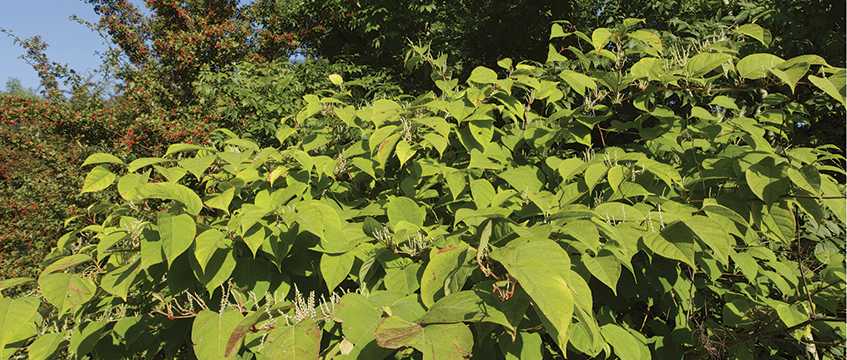Judges at the UK’s Supreme Court have been asked to rule on a thorny question relating to the encroachment of Japanese knotweed onto a neighbour’s land.
The case was brought by the owner of a property in Bridgend, Marc Davies, who bought the property in 2004, years before knotweed had been identified as a problem plant. The council owned land adjacent to his property where knotweed had probably been present for 50 years.
In 2012, the Royal Institute of Chartered Surveyors published a report identifying knotweed as a problem. In 2014, the council was told about knotweed on its land, but didn’t start to treat it until 2018. Meanwhile, Davies had become aware of the knotweed and sued the council, saying the plant had reduced the value of his property.
The case flip-flopped through the courts. Meanwhile, the now treated knotweed rhizomes are lying dormant in the soil at the the bottom of Davies’ garden, suppressed by herbicides.
In January last year, the Court of Appeal awarded Davis £4,900 in compensation for “diminution” in property value, saying the council failed in its duty as a neighbour by not treating the knotweed between 2013 and 2018, even though the weed probably encroached on the property before Davies bought it.
Bridgend Council appealed and the case was heard at the Supreme Court this week.
The council’s lawyer, Matthew White, argued the council shouldn’t be held liable because the knotweed encroached on Davies’ property before they had a duty to do anything about it.
Meanwhile, Davies’ lawyer, Tom Carter, argued that, even though the knotweed had been treated and is now known to be less hazardous than previously thought, the “stigma” attached to it will likely lead to the property losing value when it next gets put on the market.
“The single issue that I say is at the heart of this appeal,” said White, for the council, “…is whether the defendant is liable for the residual diminution that arises because knotweed was once growing on the land.”
He said they must note that this “residual diminution”, or devaluation, is said to have occurred “in circumstances that would have been the position if the defendant and had never been in breach”, because the weed had moved from council land to Davies’ land before knotweed had been identified as a problem.
He said the “claimant must prove what loss was in fact caused by the breach”.
The five-judge panel reserved judgment. Lord Redd, the president of the Supreme Court said they would hand down their ruling “in due course”.
Davies (Respondent) v Bridgend County Borough Council (Appellant)
Supreme Court (Lord Reed, Lord Lloyd-Jones, Lord Burrows, Lord Stephens, Lady Simler) 27 February 2024











